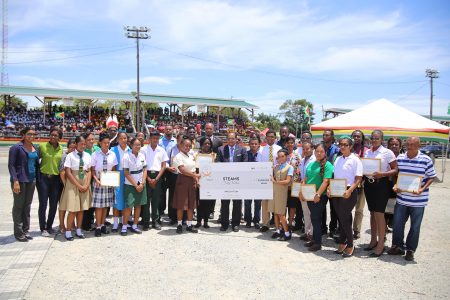The Government of Guyana through its Innovation Programme on Friday awarded $40 million in grants to 24 groups and 13 Science Technology Engineering and Mathematics (STEM) clubs to fund proposals to solve social and environmental problems.
Notable among the winning proposals was the Autonohouse project, the brainchild of architect Renée Reynolds and Information Technology professional Rowen Willabus of IntellectStorm, which received a grant of $10 million. Autonohouse hopes to provide a sustainable solution to problems created by squatting. It is prefabricated housing solution, which offers design flexibility, onsite maintenance and speed and mechanisation in construction.

In May of this year, the Ministry of Education called on Guyana’s youth to design, develop, and produce innovative ideas to foster a green economy using Science, Technology, Engineering, Agriculture, Anthropology, Archaeology, Architecture, Arts, Mathematics and Spirituality (STEAMS).
Specifically, they were challenged to propose a solution to societal issues or overcome challenges through the application of STEAMS along with a budget/estimate.
Though the programme was initially open only to participants between the ages of 16 and 35, Minister of Education Nicolette Henry explained on Friday that response was so overwhelming that the ministry was propelled to re-organise the Youth Innovation Project of Guyana into the Innovation Programme of Guyana.
“We have been inundated with solutions to the challenges of flooding, overcrowding, school dropouts, and illiteracy; the issues of mental health, gender discrimination and sexual and reproductive health; the problems of bullying, poverty, and food insecurity,” she told those gathered at the National Education Day rally at D’Urban Park.
These solutions, she explained, poured in from most regions across Guyana. “We have heard from our citizens. They have outlined the problems and proffered solutions. These solutions, undoubtedly, form the frame of reference for non-formal education in Guyana. Education Sector Reform will be enhanced when every Guyanese is engaged in capacity building, is contributing to resolution of issues, and is engaged at an unprecedented level of tolerance,” Henry further noted.
While a specific number of applicants was not revealed, the minister said that almost half of the proposals have been funded.
The other proposals awarded grants included the Hosororo Village, of Region One (Barima-Waini), with a proposal for alternative livelihoods for the youth through Science, Architecture, Agriculture and Mathematics.
Also successful was the Kabakaburi Village Council, of Region Two (Pomeroon-Supenaam), which, according to Brigette Hinds, Management Consultant of the project, joined with youth of the village to propose a friendly space for the learning of the Arawak Language, a building of a museum and a skills-training facility.
The Building Bridges Foundation, of Region Three (Essequibo Islands-West Demerara), received a grant for its proposal for innovative ways of sewing and performing janitorial services for women and youth empowerment. Its proposal covered the procurement of a training centre for sewing and janitorial activities. Additionally, the community of La Parfaite Harmonie, also of Region Three, proposed a neighbourhood beautification project.
The African Cultural and Development Association (ACDA) also received a grant for proposal for a greenhouse for food security as well as a youth aviation camp intended to teach the youth to fly in a safe and competitive airline environment.
Also receiving grants were the Green Guyhoc, which proposed a project using agriculture, engineering and architecture to achieve cohesiveness and sustainable growth, and the Non Pareil Airstrip Greenhouse club, which proposed the use of non-biodegradable materials for construction.
St Cuthbert’s Mission got a grant as well for its proposal of a Benab project as did the Youth Ministry of the Guyana Conference of Seventh-day Adventists for a Youth Empowerment Project to be situated in Bartica, Region Seven (Cuyuni-Mazaruni). This project is expected to provide vocational skills, social enrichment, mentoring and education.
Also funded are the SWAP Mobile App, which encourages the bartering of goods and services under the slogan “learn, earn, connect and save,” and “Technology for Special Needs” proposal to assist children who are physically challenged through the use of technology to increase their capabilities.
A $125,000 grant was also awarded to the students of the Queen’s College Science and Technology Club, which teamed up with the University of Guyana to propose a project called “Fulfilling a Coconut’s True Potential.” This project aims to replace foreign-made soap with a sustainably-produced Guyanese product. This product will be created through the saponification of coconut oil and wood ash.





